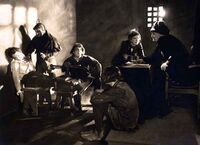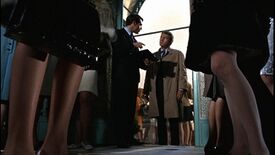Uncyclopedia:How To Be Funny And Not Just Stupid
“A foolish consistency is the hobgoblin of small minds.”
Welcome! This nutshell article will show nuts how to write something that is funny and not just stupid — hence its name. Of course, to writers who are just stupid (and sensitive about it), we start with a profuse apology, though you too can learn to write funny Uncyclopedia articles. Once you finish reading this and write an article of your own, you will be certifiably funny; and if anyone doubts it, you can point them here and tell him you are an Uncyclopedian, and that should settle that!
This is a guide, not a rulebook. Each of its points has been broken somewhere, and really good writing or a really good result is something we all respect more than rules. Almost as much as threatening to publish photos of an Admin cross-dressing.
Understand the big picture
Uncyclopedia is a satire of an encyclopedia, as The Daily Show is of television news. This is the "frame" into which every article fits. Uncyclopedia gives your writing a big comedy push, by making it look like Wikipedia. Your writing should fit in the frame and help feed this biggest joke of all, that Uncyclopedia really thinks it is telling the truth about real-world subjects.
How does a frame work? On The Daily Show, Jon Stewart looks like an anchorman, and delivers the same news as CNN does, but with material that makes fun of both the newsmakers and of anchormen. This is satire: the same basic content with specific, pointed, unexpected contrasts. Stewart doesn't sing funny songs or throw pies at people's faces. His comedy preserves the frame of a news broadcast, as your articles should preserve the frame of an encyclopedia.
If you have funny stuff you want to write that can't fit the encyclopedia frame, we have many other projects. If you want to present a cracked version of a news release, take a look at UnNews. You can write step-by-step HowTo guides, UnBooks, explanations of Why? something is the way it is, satire UnTunes, and so on. Rather than a free-form website for amateur comedy, we are a series of projects in which the articles fit into various frames.
Getting started
Pick a subject
- Main article: How to get ideas for your article
The first decision is what to write about. It should be something you are familiar with — and it must be something the reader is familiar with, or else you'll have to spend time bringing him up to speed. If the reader is never going to be familiar with it, you had better pick again. Uncyclopedia:Vanity Policies explains why we almost never want an article about your grade school, your college dorm, your new band that you and your buddies just formed, your high school, or your chess club. Not only are these subjects never going to be relevant to your reader, you'll have to explain everything in order to set the stage for any joke (and every other grade school is probably the same). A good way to start is to write about a big city you live in or near. Click on a red link (not this one!), which names a nonexistent article (such as our missing articles on U.S. Presidents), if you think you could write a good article on the subject. Or pick something from the list at Uncyclopedia:Requested articles.
Get real
The way Uncyclopedia works is that the reader looks up an article on a real person or thing (including a real movie or book) and we deliver a totally unreal take on it. So your jokes need to key off something real, or at minimum, something notable enough to be mentioned in Wikipedia. An article on El Salvador can modify its own title with {{Title|El Humidor}} to call the nation something else — once the reader arrives — but the joke name should not be the page name. Do not make the reader guess your punch line before he can read your joke!
Much of your encyclopedia article will be unreal, but it will be funniest if it has a clever relation to the real world. (If you are perturbed, go back up and re-read about the big picture.) Free-form fiction, fan-fiction, unnotable fictional cults, and sequels you wish they had made, generally don't fit well here. They may fit better in another of the website's projects, such as UnScripts or UnBooks.
Have a comedy plan
The next step is to decide how you plan to be funny. There are several plans that are not funny:
- True ≠ funny. If you think that someone or something in real life is funny (you mean stupid or absurd), an essay explaining why will probably not be original comedy — especially if you have to point the reader to other websites to read the evidence to support your position. This is instead advocacy. The facts that prove that George W. Bush was a ridiculous President don't belong here — even if you retell them and sprinkle in toilet puns.
- Untrue ≠ funny. Writing the opposite of the truth could be irony, but only if done cleverly to make a deliberate point. Fiction is not necessarily funny; War and Peace is fiction, but far from a knee-slapper. So if you write a story with fictional elements, make it funny, and be sure to explain any unfamiliar background so the reader can relate to your story.
- Random ≠ funny. Spewing a bunch of nonsense or plucking ideas out of the air doesn't work either. Anyone can free-associate, and it may prove you have a fertile mind, but one not directed toward amusing the reader. If someone types in "Frodo Baggins", he wants to read a humorous slant on Frodo Baggins, not an article on a Dutch mink farmer with laser-beam eyes.
Let's take an example:
- "Erik Estrada was born in 480182525234 BC to Chuck Norris and Oprah for the sole purpose of fucking up humanity."
- Bad. This sentence combines an unbelievable date, memes (Chuck Norris and Oprah) that serve as noise and not yucks, and an outrageous assertion that doesn't relate to anything — with a needless swear for added laughs.
- "Erik Estrada parlayed a successful stint with the California Highway Patrol into an acting career."
- Better. There is a plan here: Estrada played a cop on TV in CHiPs, and the writer might intend to deliberately confuse the actor with the role he played.
What are sample comedy plans for an article?
- That an actor is really the character he played — or thinks he is (example above).
- That a celebrity is the exact opposite of the way we know him.
- That the article writer hopelessly mistakes the article's subject for something that sounds similar, or for something completely unrelated.
- That the article will explain why the things we like about a show are simply impossible.
Read the Wikipedia article. If you deliberately misread it (lay a mondegreen), following that mistake to all its "logical" consequences may be your comedy plan.
If you've been handed a topic and told to come up and talk about it to the rest of the class for five minutes, that was to cure you of stage fright, not to hear your best stuff. Many articles read like five-minute blabs. The better ones are the result of advance planning.
Some basic techniques of humor writing
The previous section gave your article a game plan, but you still need to learn some moves to the laughter basket.
Misdirect your reader
The most basic move is to keep your reader scrambling. Feint left, juke right! Set him up for a serious read and then drop absurdity on his head!
Be serious with the dry stuff to lull your reader into not expecting that cooler of Gatorade humor. If you wisecrack with a person's date of birth and death (like "9000 BC"), the reader will start to tune you out. Make your article look just like Wikipedia until you drop the hammer on him!
Here are some examples of misdirecting the reader:
- Be silly about serious things, as does Segregation or Axis of Evil Hot Dog Eating Competition. Approach a very serious topic with outrageous lightness, the Pollyanna treatment, the loony perspective, where the "Axis of Evil" is turned into a hot dog eating competition. That's something the reader won't expect.
- Be serious about silly things. Examples include Handgun and The GI Joe-Transformers War. Pointing your finger and going "bang bang!" is child's play. Morphing this into an article about robot Nazis surprises your reader as surely as the previous example.
- Use a straight man. Don't be ridiculous from cover to cover. A little seriousness makes absurdity funnier. A comic routine uses a straight man for this: Marge Simpson's seriousness throws Homer's idiocy into sharp relief; Graham Chapman plays his King Arthur completely deadpan, making the rest of Monty Python and the Holy Grail that much more absurd by comparison. So some parts of your article are your "straight man": the background information, facts, and statements that seem factual. These parts build and support the jokes and make them funnier by comparison. You will sound more like a lunatic when there is a sane man in the room. Examples include Hiroshima and Fire hydrant.
- Absurd sequences: A sequence that starts out reasonable and sensible, then becomes increasingly absurd is funny. A sequence that ends exactly the way it began is almost needless. Example: Among the monastic sins listed by Saint Anselm are sodomy, bestiality, wearing clean underwear, and getting closer than 40 miles to a woman. Your reader expects a list of actual sins — then you cross him up! It works for a single sentence, a whole article, or putting live moray eels down your pants.
- Absurd status: Stephen Colbert has suggested that all good humor involves status change. For example: you are walking down the street and bump into the President of the United States. He apologizes to you profusely, gets flustered, then asks you for your autograph. That's funny!
- Irony: Sometimes, a touch of irony is great for a twist in an article. For example, if a man walking down the street is hit by an ambulance and one of the paramedics jumps out and says, "Oh God, oh God, I'm so sorry. Please, someone call 911, quick!" That could be funny. Even random humor — which this guide advises against — can be funny, if it occurs when the reader is least expecting it. Oscar Wilde being decapitated but then growing a new head is random, but funny when it happens in The Most Quotable Smackdown of All Time.
Other techniques
Here are some other good comedy moves:
- Repetition. This one is stupid, but it works. Say something over and over, and then repeat it, and then say it some more. Two or three times. Example: In his spare time, young Luke Skywalker enjoyed driving his land speeder, whining, shooting womp-rats, cruising for chicks in Mos Eisley, whining, nerf-herding, and whining. Sometimes, driving a joke into the ground makes it funnier. Other times, it just makes the joke dead, so please be careful, cautious, and vigilant if you decide to use this technique. And also be careful.
- Imitation. Pages that look like the things they're about is a recurring technique. So the article on Nihilism is blank; the article on Redundancy is redundant, repetitive, and repeats itself; the article on the poet e e cummings is all in lowercase; and frankly, the less said about Sexual innuendo, the better. But do note the cautions below; imitation, without humor, is not humor. Also, be sure the average reader will be familiar enough with the page's subject to understand that a bizarre page style is imitation. Otherwise, plant serious hints in your article which, in passing, explain it to the reader.
- Clever choice of words can supercharge your writing, no matter how funny it is. For more about this, see Uncyclopedia:Choice of Words.
- Repetition. This one is stupid, but it works. Say something over and over, and then write it again in a different style, and then say it some more. Three or four times. Example: Enslaved persons didn't like being forced to work, but nobody cared and they were whipped and auctioned off. The government agreed that nobody cared about black people and prohibited giving them rights. There was a civil war, but nobody cares why or who won. Sometimes, driving a joke into the ground makes it funnier. Other times, it just makes the joke dead, so please be careful, cautious, and vigilant if you decide to use this technique. And also be cautious.
- Self-reference. Again, sort of an obvious technique but it can be funny. "Repetition" repeats, "Misdirection" veers off into Australia, "Escalation" escalates. See this article's section on Self-reference.
- Understatement. For instance, "many people would say that the Holocaust was not a good thing". Writing "Joe Biden is so stupid!" is not as funny as taking a more understated approach, such as: "Joe Biden is not quite as intelligent as a mildly retarded woodchuck suffering from late-stage syphilis." It's funny that our Coruscant article describes a "slightly overpopulated planet".
- Repetition. This one is stupid, but it works. Say something over and over, and then write it again in a different style, and then say it some more. Three or four times. Example: Enslaved persons didn't like being forced to work, but nobody cared and they were whipped and auctioned off. The government agreed that nobody cared about black people and prohibited giving them rights. There was a civil war, but nobody cares why or who won. Sometimes, driving a joke into the ground makes it funnier. Other times, it just makes the joke dead, so please be careful, cautious, and vigilant if you decide to use this technique. And also be cautious.
- Reversal. Example: Local cancer loses battle with woman. Other example: Work is the curse of the drinking classes. - Oscar Wilde.
- State the Obvious- This rule can sometimes be hilarious, especially when the reader isn't expecting it. Other times, it can fall flat. A good example is a picture of a gay rights protestor holding up a sign that says "Homosexuals are Gay". You wouldn't expect to see that! Use it sparingly; an entire article of obvious statements will just come across as stupid.
- Did I mention Repetition?
Write nonsense well
Start it well. The start of your article needs to attract your reader by giving him a taste of the fun he is about to have. Digressions, overlong lists (including the ten other names by which the subject is known), and overuse of initial quotations kill this effect. New authors who haven't read the entire article but stick a gag into its first sentence are not helping.
Write consistently. Uncyclopedia uses many different styles. Some articles have a scholarly feel, while others are deliberately stupid. But a single article should use a single style. When the style changes from section to section, as though the page were written by committee, or when an article contradicts its own facts, it distracts and confuses the reader. Any exceptions should be intentional — say, writing on multiple-personality disorder. Even AAAAAAAAA!, which lacks grammar, words, and 25 of the letters of the alphabet, is consistent.
- Which tone to use? Scientific paper, or slack-jawed drivel? Before starting a new article, decide what style of writing best fits your subject and your comedy plan. Try it several ways to see which seems funniest.
- British or American? We don't care; there are Uncyclopedians everywhere. Use your own style except when that would be a distraction, given what you're writing about.

Write compatibly with what was already there. Read the whole article and understand the original authors' choice of style, comedy goal, and region, before you edit. Don't just replace words with their opposites — you will break something! If you want to create an "alternate theory" to what's in the article, or add a section from a different point of view, create your own article, or find another article where your edit fits better. We allow multiple articles on the same subject, we don't care if they contradict each other, and we have many ways to point readers to all of them. It's invigorating to have articles with different viewpoints, especially as readers' senses of humor are different. For several politicians, we have competing articles. We do care if an article contradicts itself, because random hodgepodges — unless intentional — repel the reader. If you find an unintentional hodgepodge, and can repair it, God speed to you!
Make each article funny on its own. A story line that spans several articles may force the reader to read them all to get the joke. If you find yourself creating such a "story arc," consider copying in any information the reader will need to enjoy the article, even at the risk of repeating something said elsewhere. Alternatively, try putting these story arcs into our UnBooks project instead.
Spend some time
- A quality article attracts readers and may be voted to the main page. Our business is parody, but that only means that our information is crap, not that our articles should look like crap! As much effort as it takes Wikipedia to track down the correct facts, it can take just as much effort to present a spoof of it that is truly entertaining.
- Research. It may be funny to take an article in random directions. But it's especially funny to research the real thing — such as reading the corresponding Wikipedia article — and write stuff that is an absurd portrayal of reality. The result will be an article that's not just something anyone could have written.
- Write actual prose. If you have several ideas, simply turning them into a list isn't as funny as when you spend the time to develop each idea. We say more about over-use of lists below.
- Write actual articles. Articles that consist of a single sentence — to play off the page name to play word-association or deliver a single punch line — will be deleted, funny or not, because they don't support the encyclopedia "frame." Take the time to attack the subject from several different comedy directions.
- Revise and delete. More is not necessarily funnier! Most writing is bad — especially most first drafts. Get a good night's sleep, then try re-reading your work as though for the first time. None of us here is paid by page count, and the quickest way to improve an article is to cut out the bad ingredients, no matter how funny you thought they were at first. Correct your own misspellings and errors, reconsider all those side-jokes, evaluate everything to see whether it feeds the article as a whole. Even Shakespeare devoted time to revising and polishing his plays.
Tastelessness is not funny by itself
Not everyone likes scatological or "toilet" humor, so there's no reason to swear like a drill sergeant in every other sentence. In fact, many people simply find it immature and disgusting, and may not only start avoiding your articles, but Uncyclopedia as a whole. Obscenity can be funny when:
- The reader isn't expecting it; such as a sudden swear in an article that had kept a scholarly tone
- When it puts an article in the style of the thing or person it's about. If you are writing about Johnny fucking Borrell, the swear word has a point: It's imitative.
Likewise calling something "gay" — like "slutty" and "greedy" and "commie" and "Nazi" — if you do the work to show you are making a comedy point, good. If you are dropping epithets to avoid doing work, the article won't be funny.
Always think about amusing the reader — not amusing yourself by shocking the reader or making him uncomfortable.
Avoid lists
Sections entitled Trivia or Fun facts, and other sections that are simply lists of one-liners or names, are not funny enough.
- Instead of stating a funny idea as a list item, take the time to develop it into a truly funny paragraph.
- Just putting a name into a list, thinking it will be funny with no additional work, is using it as a meme and not writing humor at all.
- No list gets funnier merely by getting longer, and many get less funny.
Simple lists invite anonymous overnight editors to try to "improve" the list by adding just one more thing. Many of these editors didn't read the whole article and don't understand the whole joke; and the list becomes more and more random. Likewise, stating an "Alternate Theory" invites many more alternate theories with little to do with the original theme.
Lists that could be endless (such as "List of people who didn't fight him" or "List of stupid things" or "people whom Oscar Wilde hates") quickly become endless. Galleries of images often have these same problems (see below).
If you must make a list, discuss each list item, as in Worst 100 Movies of All Time, or break it into different jokes, as in Worst songs to play at a funeral.
Avoid clichés
Many uninventive definitions follow overused formulas. These include:
- The first and second person: Avoid using the words "I," "me," or "my." Even avoid the editorial "we," and don't address the reader directly ("you"). Accept your off-stage role as the playwright; don't put yourself into the article as the stand-up comic. As elsewhere, you can break this rule when the reader will surely not be expecting it. But it's tedious to break it so much that it looks as though you want more attention.
- Nonsense numbers. Avoid extremely large numbers, like 2193732483249 or 9999999999999. A smaller, but round number can be funnier.
- This includes assertions that more than 100% of a population is something or other: please exaggerate in more clever ways than simply using a statistic that can't be true.
- Ridiculous dates simply confuse the reader; they don't make your article funny. This includes saying someone did something after the year you say he died. Unless your article is about time travel, you're not going to make someone laugh by choosing ridiculous dates; you'll just make him conclude it's not worth the time.
Avoid stagnant jokes
"Stagnant" is like the inside of your refrigerator after the power has been out for a couple days. Stagnant things aren't automatically unfunny like the clichés discussed in the previous section; they have become unfunny just by being repeated to death.
You see, if the newbie sees that a lot of our articles deal with kitten huffing (it was funny in 2007), and he works that into his new article, people don't say, "Look! the new guy fits in because he writes about kitten huffing just like we do!" They say, "Look! the new guy can't write humor but only imitate." So be original. The more you see an ingredient used in articles, the further back in your comedy Spice Rack you should reach.
There is nothing you absolutely have to avoid, if you have an obvious good reason or a very clever writing style. But anyway, avoid these things:
Pop culture. Don't expect instant Funny because something is going viral on the Web, is popular on TV, or is a high-grossing movie or a popular anime.
Caricatures. Unless you have a brilliant and original take on the subject, there has been enough about chavs, emos, basement-dwellers, nerds, gays, and so on.
Memes. There are a few to be sure to avoid: Chuck Norris, Russian Reversal, Mr. T, Steve Ballmer, Kanye West, kitten huffing, and your mom. Captain Obvious and Captain Oblivious have worn out their welcome as ways to insert unfunny stuff in articles and call it funny. Also some new Hitler, Darth whatever, or Jesus. Articles with these in them, are the red-shirts when on a Star Trek away mission.
If you must insert a celebrity into an unrelated article, have a point in mind. For example, saying "Eminem was the daughter of Pat Sajak and Mickey Mouse" is pointless drivel. But saying "Eminem is the son of Dr. Dre and Queen Latifa" might parody Eminem's adoption of black culture. Have a comedy goal and make everything in the article help you get there.
Pranking the reader. Yes, typing {{USERNAME}} into an article gets changed to the reader's Uncyclopedia username, and he gets all nervous about who typed his name into an article and how we already know so frickin' much about him! This joke is all worn out. Likewise, the many pieces of Wikicode you can type into an article to make it display differently on every different reading, mean you are amusing yourself and not the reader. Other techniques that don't amuse the reader but at most amuse you at his discomfort are pages that redirect or circle back to themselves and pages that seem to repeat the same thing forever (there is a complete set of these). Your humor should not have to rely on techie tricks like these; it should just be, like, funny.
Stagnant themes. Once you have chosen an article to write, its theme is the (funny) point you are trying to make. Some themes have become stagnant by overuse:
- That the writer of the article doesn't know about the subject, that he doesn't care, or that nobody cares. This has been done well a few times, but it instantly keeps your article from looking realistic, and it's no longer clever enough to justify that.
- That a female you are writing about is a slut or a whore.
- That a state or region you are writing about is a Soviet republic.
- That the subject you are writing about is involved in a struggle between God and Satan.
- Anything regarding Grues, or Kitten Huffing.
- That the subject you are writing about is associated with Nazis, or Hitler.
- Vulgar or obscene treatment, especially rape, especially anal rape. If there isn't a good reason it fits into your article, it's not funny by itself.
- How this person, place, thing, politician, or sports team is just shitty. Displaying how cleverly you can insult something instantly turns off the half of your readers who like it, and probably won't inspire the half who already hate it.
Stagnant articles. There are entire classes of article that have been tried too many times:
- A made-up sequel of a popular movie or video game — the way you would have written it — or a new Pokémon or text adventure.
- A new Wacky War or Wacky Religion.
- Anything regarding My sojourn.
Nonexistent things. Any article you create on a person or thing that doesn't exist — any article whose title is a pun — is an article no one is going to look up in this or any other encyclopedia. The reader has to guess your punch line to read your joke! Instead, anchor the article to something that does exist. Inside your article, you can change its name to your heart's content, and even use {{Title}} to make the page pretend it had a different name.
Stagnant jokes that interfere with the operation of Uncyclopedia may get you in trouble, such as redirecting or blanking other people's work. Nominating Votes for deletion, for deletion (or someone else's talk page): Stagnant! Been done! Over 9000 times!
Pages that look like the things they're about
Imitative pages are a big part of our history, but imitative is not funny by itself, nor even clever. Of course a page on Green ink is going to have green text, but that plays the same minor role as a photo with a funny caption. It is a comedy play where the stage props are funny too, as opposed to a play that relies on its props to make it funny.
Transforming a long article to be in the accent or impediment of its subject makes it harder to read, just to tell the same joke over again, as a list (see above) might. An old version of Eclipse, where text from Wikipedia was "eclipsed" by a big black disc that made it unreadable, was a feat for the author, but not funny for the reader. It may be a no-brainer how to write an article on "Mistake" — just make a lot of mistakes — but no-brainers are rarely good reads. Don't even get me started on Repetition, lest I repeat myself.
Section blanking is an article whose humor is more than just a list of blank sections. Even in AAAAAAAA, the one simple joke is cleverly pulled in many different directions.
Don't steal stuff
Uncyclopedia is here for you to write original comedy — not merely to catalog funny stuff that someone else did somewhere else. This almost always means we don't want a link to your favorite YouTube video. Writing an article about a comedy act or movie, a YouTube channel, or a web meme, will not last here unless you write funny stuff about it, instead of describing how funny it already was. You can pursue a theme that was pursued somewhere else, if you add something new. But writing about something "For Dummies" steals a clever slogan that a company was using, probably for the exact humor purpose you plan to use it for.
If you get a photo onto your computer, you can copy it onto Uncyclopedia by just going to Special:Upload, following the instructions, and remembering the name you gave it.
Most of our photos are stolen. This brazen theft is covered by two legal doctrines with fancy names:
- Fair use, which means the subject is a celebrity or was in the news — and had it coming.
- Penny ante, which means: Who has the money to sue such a small-time website as this?
But stealing photos to steal their comedy is just wrong, as is plagiarizing entire articles from other comedy websites. This includes:
- Most "Motivational Posters"
- Scanning in an entire comic strip or an article from The Onion, or something you saw on the Web that was already funny so you don't have to do any work (sorry, copying and pasting doesn't count as work).
- Relying on a "make your own meme" website that captions a picture for you.
It's far better to upload just the photo, with no caption or punch line — for example, a photo from a newspaper — and write your own caption (as we have done on this page) to make it funny, or take an existing picture and Photoshop it to make it funny. That's original comedy. If you are caught repeatedly stealing articles from other comedy sites, the articles will be deleted, and you will be banned.
Avoid in-jokes
Just because it's funny to you and three of your friends doesn't make it funny to us. In-jokes and had-to-be-there-moments assume the reader had special situations or experiences to understand the humor. These won't amuse most Uncyclopedia readers, who may be anywhere in the English-speaking world. For example, articles on things like Call of Duty must be especially good to overcome the fact that only gamers can truly appreciate them. Don't use Uncyclopedia to try to start a new in-joke.
Avoid vanity. We usually quickly delete articles about your fanfic, your story characters, or your story setting. Personal story-arcs (related articles that matter to each other but to no one else) can only live inside your own userspace.
Likewise articles about your school or college, and especially about your school club, fraternity, or dormitory. These are not notable to most Uncyclopedia readers.
Don't write about Uncyclopedia itself. Articles about other Uncyclopedians and events that happened on this website are certain not to be notable to average readers; their audience is limited to your fellow Uncyclopedia authors. Make sure your goal is humor — not establishing yourself as an insider. You are welcome to ridicule life on Uncyclopedia at the Village Dump, being sure to use the BHOP section if it isn't an important point about the website or its policies or future. See also Navelism, which covers this ground like a collapsed tent.
Use pictures wisely
A picture is a perfect complement to a good joke, but only if it is well-made. Chopping up a picture of Tony Blair's face in MS Paint is not well-made (unless you're making the picture look bad for a satirical purpose). Taking time on the picture and using a full-featured program such as GIMP or Photoshop is advisable, although some people can knock out decent images on MS Paint.
Galleries of photos, especially photos unrelated to the article, have the same problem we described about lists in general.
Don't think you have to be an artist! Take a normal picture with no comedy value, use your imagination to add a caption that is funny and that cleverly relates to your article, and suddenly your boring picture is hilarious. On the other hand, adding a caption that is neither of the above — say, a personal reaction or a wisecrack — suggests that you are guiding readers to someone else's comedy instead of writing your own. This is covered in the section Don't steal stuff.
A final coat of polish
- Speeling adn, gramor?: Unless you're misspelling words on purpose, perhaps poking fun at the hard-of-thinking or kids on social networking sites, make sure your words are spelled correctly and your grammar is good. Copy and paste your article into a word processing program such as MS Word, Google Docs or OpenOffice to see misspellings, or ask for personal help at UN:PROOF(especially if English is not your first language). And avoid chat abbreviations unless you have something in mind, LOL.
- Style: Unfortunately, there is no Elements of Style for writing humor, and it would be difficult to write one, since humor often comes from breaking the rules. However, there is an Elements of Style for writing in general, which is called The Elements of Style. To the extent that knowing the craft of writing makes you a better humor writer, this book (sometimes just called "Strunk and White" after the authors) is worth picking up, reading, and then gluing to your forehead for quick reference. George Orwell’s essay Politics and the English Language is also useful, short, and to the point.
| |||||||||||||||||||
| Featured version: 31 March 2018 | |
| This article has been featured on the main page. — You can vote for or nominate your favourite articles at Uncyclopedia:VFH. | |
















